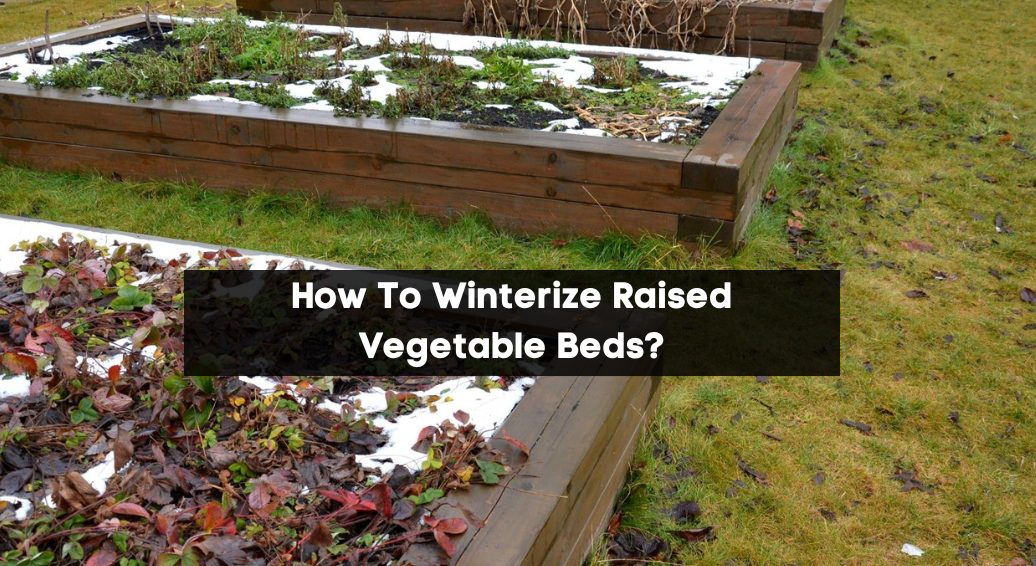Winterizing your raised vegetable beds is integral to ensuring that your garden is healthy and productive.
It involves protecting the soil, plants, and vegetables from the cold weather, such as removing dead or diseased plants, adding compost, and covering the beds with mulch. By winterizing your raised vegetable beds, you can ensure that your garden is ready for the cold months and continue producing fresh, delicious produce all winter.
In this article, we will provide a step-by-step guide on how to winterize your raised vegetable beds.
What are the steps to winterize a raised vegetable bed?
Winterizing your raised vegetable beds is integral to ensuring that your garden is healthy and productive.
Here are the steps to winterize your raised vegetable beds:
- Remove any dead or diseased plants, as well as any weeds. This will help prevent pests and diseases from overwintering in your garden.
- Add a layer of compost or well-rotted manure to your soil. This will help improve the soil structure and provide essential nutrients for your plants.
- Cover your beds with mulch, such as straw or leaves. This will help protect the soil from extreme temperatures and prevent weeds from germinating.
- If you live in a colder climate, consider using frost cloth or row covers to protect your plants from frost damage.
- If you want to continue growing vegetables during winter, consider planting cold-hardy varieties such as kale, Brussels sprouts, and root vegetables.
- In colder climates, it’s essential to ensure that your raised beds are well-insulated to prevent freezing. You can do this by adding additional layers of mulch or using blankets or tarps to cover your beds.
Here is a quick summary of the steps to winterize your raised vegetable beds:
| Step | Description |
|---|---|
| 1 | Remove dead or diseased plants, as well as weeds. |
| 2 | Add a layer of compost or well-rotted manure. |
| 3 | Cover the beds with mulch. |
| 4 | Use frost cloth or row covers in colder climates. |
| 5 | Plant cold-hardy vegetables for winter are growing. |
| 6 | Insulate the beds in colder climates. |
With these simple steps, you can ensure that your raised vegetable beds are ready for the cold weather and continue producing fresh, delicious produce all winter.


What should I do to protect my raised vegetable beds during winter?
To protect your raised vegetable beds during the winter, there are several steps you can take. These include:
- Remove any dead or diseased plants, as well as any weeds. This will help prevent pests and diseases from overwintering in your garden.
- Add a layer of compost or well-rotted manure to your soil. This will help improve the soil structure and provide essential nutrients for your plants.
- Cover your beds with mulch, such as straw or leaves. This will help protect the soil from extreme temperatures and prevent weeds from germinating.
- If you live in a colder climate, consider using frost cloth or row covers to protect your plants from frost damage.
- If you want to continue growing vegetables during winter, consider planting cold-hardy varieties such as kale, Brussels sprouts, and root vegetables.
- In colder climates, it’s essential to ensure that your raised beds are well-insulated to prevent freezing. You can do this by adding additional layers of mulch or using blankets or tarps to cover your beds.
FAQ (Frequently Asked Questions)
Can I grow vegetables in my raised beds during winter, and how do I do it?
Yes, you can grow vegetables in your raised beds during the winter. It would help if you planted cold-hardy varieties such as kale, Brussels sprouts, and root vegetables to do this.
Using frost cloth or row covers, you can also protect your plants from frost damage.
Are there any special considerations for winterizing raised vegetable beds in colder climates?
Yes, there are several special considerations for winterizing raised vegetable beds in colder climates.
These include protecting the beds from freezing temperatures, providing insulation to help keep the soil warm, and ensuring that the beds have adequate drainage to prevent excess moisture from damaging the plants.
Learn More:

